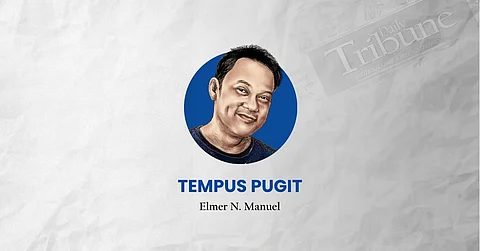
- NEWS
- the EDIT
- COMMENTARY
- BUSINESS
- LIFE
- SHOW
- ACTION
- GLOBAL GOALS
- SNAPS
- DYARYO TIRADA
- MORE

The recent ruling of the Supreme Court (SC) on the unconstitutionality of the impeachment case filed against Vice President Sara Duterte has drawn contrasting opinions which sparked debates on whether the High Court’s decision was sound or off the rails.
Of course, the louder voices came from those opposed to the ruling, and some — like political analyst Richard Heydarian and Akbayan Party-list Representative Percival Cendaña — took it a notch higher and made negative comments about the SC.
Heydarian, leveraging his substantial social media following, posted a highly provocative statement implying that the SC was beholden to Vice President Duterte’s father, former President Rodrigo Duterte, who had appointed 13 of the 15 justices.
Cendaña, on the other hand, in public forums labeled the High Court the “Supreme Coddler” of the VP and called its decision a “betrayal of the Constitution and an insult to the people’s right to demand accountability.”
While their comments are bound to the right to free expression that allows for robust public discourse and holding institutions accountable, this fundamental freedom is not absolute, especially when it veers into territory that undermines the very pillars of justice and governance.
Unsurprisingly, the comments of Heydarian and Cendaña have become ammunition for those in favor of the SC’s ruling and, as a result, both of them are facing indirect contempt charges brought by lawyers supportive of the Dutertes over their “malicious public comments” against the High Court.
To put it bluntly, this serves as a stark reminder of the perils of criticism that is perceived as a “malicious attack” that erodes public trust in the judiciary.
While the Court meticulously explained its ruling where it stressed that while impeachment is a political process, it is not immune from judicial review, particularly concerning constitutional due process, and the immediate aftermath saw a different narrative emerge.
This is where the critical “lapse of judgment” becomes glaringly apparent, as in their haste to condemn a ruling they disagreed with, Heydarian and Cendaña seemingly crossed the line from legitimate critique to what the lawyer-petitioners describe as “unlawful interference with and derogation of judicial authority.”
Their comments, disseminated across influential platforms, were not merely expressions of dissent — they were framed to suggest an inherent bias and a lack of independence within the highest judicial body.
The implication that the justices were “beholden” to a former president, rather than upholding the law impartially, was a serious accusation that, if unsubstantiated and widely propagated, could have devastating consequences for the public’s faith in the justice system.
The SC, by its very nature, is a deliberative body that interprets laws and upholds the Constitution, and its decisions — even those that are controversial or unpopular — are the result of rigorous legal analyses and adherence to established procedures.
To immediately dismiss a ruling by imputing political motives to its members, without presenting compelling legal counter-arguments, is a disservice to the complex work of the judiciary and sets a dangerous precedent where public opinion — fueled by sensationalized accusations — could unduly influence or even intimidate judicial processes.
While freedom of expression is undeniably vital for a vibrant democracy, it is equally important to acknowledge that this freedom comes with responsibilities. As officers of the court, or influential public figures, there is a heightened duty to exercise restraint and ensure that public statements, especially concerning judicial matters, are factually accurate and respectful of institutional integrity.
The petitioners rightly argued that freedom of expression “does not extend to speech that ‘obstructs or degrades the administration of justice.’” When prominent voices use their platforms to subject the High Court to “public ridicule, suspicion and condemnation” based on what is alleged to be malicious attacks, they are not only challenging a specific ruling but actively dismantling the public’s trust in the judiciary as a whole.
This situation underscores the delicate balance between freedom of speech and the imperative to protect the independence and authority of the judiciary. Criticism — even harsh criticism — is essential for accountability.
However, when it morphs into accusations of corruption or bias without concrete evidence, it ceases to be constructive and instead becomes destructive.
The indirect contempt charges against Heydarian and Cendaña serve as a powerful reminder that while dissent is a democratic right, disparagement designed to undermine the integrity of the justice system can lead to serious legal repercussions, ultimately weakening the very democratic institutions it claims to critique.
No doubt, the future of a stable and just society relies heavily on a judiciary that is perceived as impartial and independent.
However, those who seek to influence public opinion must weigh their words carefully, and they should understand the profound impact they can have on this delicate balance.
